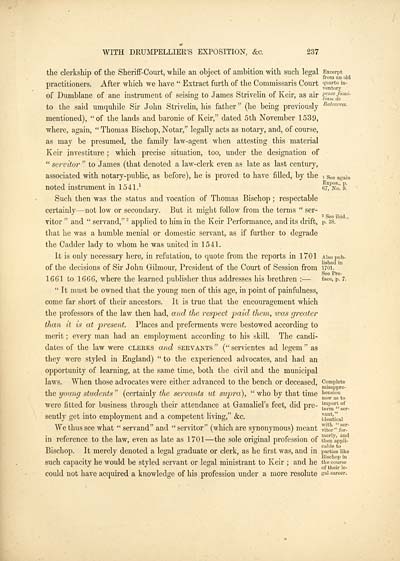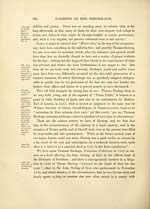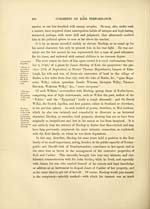Download files
Complete book:
Individual page:
Thumbnail gallery: Grid view | List view

WITH DRUMPELLIER'S EXPOSITION, &c. 237
the clerkship of the Sheriff-Court, while an object of ambition with such legal Escerpt
■■- _ _ from an old
practitioners. After which we have " Extract furth of the Commissaris Court qu'^to in-
^ ventory
of Dumblane of aue instrument of seisino; to James Striveliu of Kcir, as air m^^fami-
C-" iiOjiii etc
to the said umquhile Sir John Strivehn, his father" (he being previously ^''^"'"^^■
mentioned), "of the lands and baronie of Keir," dated 5th November 1539,
where, again, " Thomas Bischop, Notar," legally acts as notary, and, of course,
as may be presumed, the family law-agent when attesting this material
Keir investiture ; which precise situation, too, under the designation of
" servitoi- " to James (that denoted a law-clerk even as late as last centiu-y,
associated with notary-pubUc, as before), he is proved to have filled, by the i see again
noted instrument in 1541.' 67^''no.'9.'
Such then was the status and vocation of Thomas Bischop ; respectable
certainly — not low or secondary. But it might follow from the terms " ser-
vitor " and " servand," - applied to him in the Keir Performance, and its drift, p. 38.
that he was a humble menial or domestic seiTant, as if further to degrade
the C adder lady to whom he was united in 1541.
It is only necessary here, in refutation, to quote from the reports in 1701 Aisopub-
of the decisions of Sir John Gilmour, President of the Court of Session from 1701.
See Pre-
1661 to 1666, where the learned pubUsher thus addresses his brethren : — face, p. 7.
" It must be owned that the young men of this age, in point of painfidness,
come far short of their ancestors. It is true that the encouragement which
the professors of the law then had, and the resj^ect paid them, teas greater
than it is at present. Places and preferments were bestowed according to
merit ; every man had an employment according to his skill. The candi-
dates of the law were clerks and servants " (" servientes ad legem " as
they were styled in England) " to the experienced advocates, and had an
opportunity of learning, at the same time, both the civil and the municipal
laws. When those advocates were either advanced to the bench or deceased, Complete
misappre-
ihe young students" (certainly f/ie servants ut siip>ra), " who by that time tension
were fitted for business through tlieir attendance at GamaUel's feet, did pre- ["'^''.'iger.
sently get into employment and a competent living," &c. identical
We thus see what " servand" and " servitor" (which are synonymous) meant ^tOT"'for-
iu reference to the law, even as late as 1701 — the sole original profession of thtn^appii-
Bischop. It merely denoted a legal graduate or clerk, as he first was, and in parties nke
I'i'ii T-^-11 fiischop in
such capacity he would be styled servant or legal ministrant to Keir ; and he the course
could not have acquked a knowledge of his profession under a more resolute eai career.
the clerkship of the Sheriff-Court, while an object of ambition with such legal Escerpt
■■- _ _ from an old
practitioners. After which we have " Extract furth of the Commissaris Court qu'^to in-
^ ventory
of Dumblane of aue instrument of seisino; to James Striveliu of Kcir, as air m^^fami-
C-" iiOjiii etc
to the said umquhile Sir John Strivehn, his father" (he being previously ^''^"'"^^■
mentioned), "of the lands and baronie of Keir," dated 5th November 1539,
where, again, " Thomas Bischop, Notar," legally acts as notary, and, of course,
as may be presumed, the family law-agent when attesting this material
Keir investiture ; which precise situation, too, under the designation of
" servitoi- " to James (that denoted a law-clerk even as late as last centiu-y,
associated with notary-pubUc, as before), he is proved to have filled, by the i see again
noted instrument in 1541.' 67^''no.'9.'
Such then was the status and vocation of Thomas Bischop ; respectable
certainly — not low or secondary. But it might follow from the terms " ser-
vitor " and " servand," - applied to him in the Keir Performance, and its drift, p. 38.
that he was a humble menial or domestic seiTant, as if further to degrade
the C adder lady to whom he was united in 1541.
It is only necessary here, in refutation, to quote from the reports in 1701 Aisopub-
of the decisions of Sir John Gilmour, President of the Court of Session from 1701.
See Pre-
1661 to 1666, where the learned pubUsher thus addresses his brethren : — face, p. 7.
" It must be owned that the young men of this age, in point of painfidness,
come far short of their ancestors. It is true that the encouragement which
the professors of the law then had, and the resj^ect paid them, teas greater
than it is at present. Places and preferments were bestowed according to
merit ; every man had an employment according to his skill. The candi-
dates of the law were clerks and servants " (" servientes ad legem " as
they were styled in England) " to the experienced advocates, and had an
opportunity of learning, at the same time, both the civil and the municipal
laws. When those advocates were either advanced to the bench or deceased, Complete
misappre-
ihe young students" (certainly f/ie servants ut siip>ra), " who by that time tension
were fitted for business through tlieir attendance at GamaUel's feet, did pre- ["'^''.'iger.
sently get into employment and a competent living," &c. identical
We thus see what " servand" and " servitor" (which are synonymous) meant ^tOT"'for-
iu reference to the law, even as late as 1701 — the sole original profession of thtn^appii-
Bischop. It merely denoted a legal graduate or clerk, as he first was, and in parties nke
I'i'ii T-^-11 fiischop in
such capacity he would be styled servant or legal ministrant to Keir ; and he the course
could not have acquked a knowledge of his profession under a more resolute eai career.
Set display mode to:
![]() Universal Viewer |
Universal Viewer | ![]() Mirador |
Large image | Transcription
Mirador |
Large image | Transcription
Images and transcriptions on this page, including medium image downloads, may be used under the Creative Commons Attribution 4.0 International Licence unless otherwise stated. ![]()
| Permanent URL | https://digital.nls.uk/95373635 |
|---|
| Description | A selection of almost 400 printed items relating to the history of Scottish families, mostly dating from the 19th and early 20th centuries. Includes memoirs, genealogies and clan histories, with a few produced by emigrant families. The earliest family history goes back to AD 916. |
|---|

